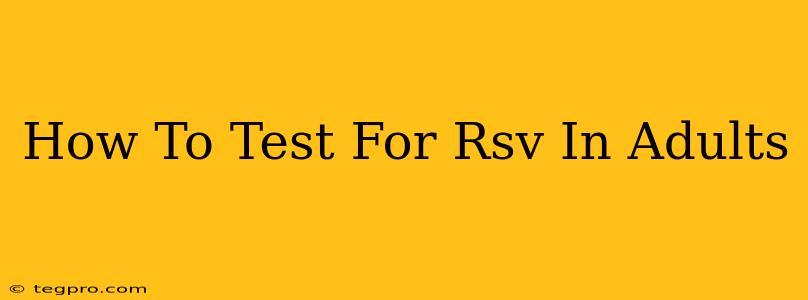Respiratory syncytial virus (RSV) is a common respiratory virus that usually causes mild, cold-like symptoms. While it's often associated with infants and young children, RSV can also affect adults, sometimes leading to more serious complications. Knowing how to test for RSV in adults is crucial for early diagnosis and appropriate management. This guide will walk you through the available testing methods and what to expect.
Understanding RSV in Adults
Before diving into testing, it's important to understand the characteristics of RSV in adults. While most adults experience mild symptoms, some may develop pneumonia or bronchitis, particularly those with underlying health conditions like chronic lung disease, heart disease, or weakened immune systems. Symptoms can include:
- Runny nose: Often a clear discharge that may later become thicker and discolored.
- Cough: Can range from mild to severe.
- Sore throat: A scratchy or painful throat.
- Headache: A common symptom, often accompanied by other respiratory symptoms.
- Muscle aches: General body aches and pains.
- Fever: While not always present, a fever can indicate a more severe infection.
- Shortness of breath: A serious symptom that warrants immediate medical attention.
- Wheezing: A whistling sound during breathing, often indicative of airway constriction.
If you experience shortness of breath or difficulty breathing, seek immediate medical attention.
How is RSV Diagnosed in Adults?
Diagnosis of RSV in adults typically involves one or more of the following methods:
1. Rapid Antigen Tests:
- How it works: These tests detect RSV antigens (proteins) directly from a nasal swab sample. Results are typically available within 15-30 minutes.
- Accuracy: Rapid antigen tests are generally quick and convenient, but they may not be as accurate as other methods and may produce false negatives.
- Availability: Widely available in doctor's offices and urgent care clinics.
2. Molecular Tests (PCR):
- How it works: Polymerase chain reaction (PCR) tests are highly sensitive and specific tests that detect RSV genetic material. They are more accurate than rapid antigen tests but take longer to produce results (usually 24-48 hours).
- Accuracy: Considered the gold standard for RSV diagnosis, offering higher accuracy and sensitivity.
- Availability: Commonly performed in clinical laboratories.
3. Viral Culture:
- How it works: This method involves growing the virus in a laboratory setting. It's the most definitive test but takes several days to produce results.
- Accuracy: Highly accurate but time-consuming.
- Availability: Less commonly used due to the time required for results.
Your doctor will determine the most appropriate testing method based on your symptoms, medical history, and the availability of testing resources.
When to Seek Medical Attention
While many adults recover from RSV with supportive care at home, it’s crucial to seek medical attention if you experience:
- Severe shortness of breath or difficulty breathing.
- High fever (above 102°F or 39°C).
- Worsening symptoms after a few days.
- Underlying health conditions that put you at higher risk of complications.
Early diagnosis and treatment are essential for managing RSV in adults and preventing serious complications. Don't hesitate to consult your doctor if you suspect you have RSV or are concerned about your symptoms.
Preventing the Spread of RSV
Practicing good hygiene is crucial in preventing the spread of RSV:
- Frequent handwashing: Wash your hands thoroughly and often with soap and water.
- Avoid touching your face: Avoid touching your eyes, nose, and mouth.
- Cover your coughs and sneezes: Use a tissue or your elbow to cover your mouth and nose when you cough or sneeze.
- Stay home when sick: Avoid contact with others when you are sick to prevent spreading the virus.
By understanding the testing methods and knowing when to seek medical attention, you can effectively manage RSV infection and protect yourself and others. Remember that early diagnosis is key to a quicker recovery.

